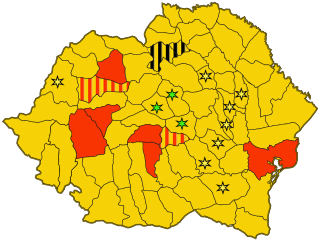Parliamentary elections were held in Greece on 25 September 1932. All 250 seats in the Lower House of the Greek Parliament, the Chamber of Deputies, were elected, as well as one-third of the seats in the Senate. The outcome was an ambivalent result for the two biggest parties, the Liberal Party of Eleftherios Venizelos and the People's Party. The People's Party received a plurality of votes in the Chamber of Deputies elections, but won fewer seats than the Liberal Party. The Liberals also won the most seats in the Senate.

General elections were held in Romania in December 1937. The Chamber of Deputies was elected on 20 December, whilst the Senate was elected in three stages on 22, 28 and 30 December. Voting was by universal male vote, making them the last elections held before female suffrage was introduced.

The Magyar Party was a political party in post-World War I Romania.

Parliamentary elections were held in Czechoslovakia on 27 October 1929. The Republican Party of Farmers and Peasants, emerged as the largest party, winning 46 seats in the Chamber of Deputies and 24 seats in the Senate. Voter turnout was 90.2% in the Chamber election and 78.8% for the Senate. The rightward shift of the 1925 elections was reversed, with moderate centre-left groups increasing their vote shares whilst the Communist Party suffered a set-back.

Full general elections were held in Belgium on 14 October 1894, with run-off elections held on 21 October 1894.
Full general elections were held in Belgium on 2 June, 1912.

Parliamentary elections were held in Portugal on 8 November 1925. The result was a victory for the Democratic Party, which won 83 of the 163 seats in the Chamber of Deputies and 39 of the 70 seats in the Senate. Following a military coup in 1926 and the subsequent Estado Novo period, the 1925 elections were the last truly multi-party elections in Portugal until the 1975 Constituent Assembly elections.
General elections were held in Romania between 1 and 3 March 1922. In the first stage between 1 and 3 March, seats in the Senate were elected. In the second stage between 5 and 7 March the Chamber of Deputies was elected, and in the third and final stage from 9 to 11 March, additional Senate seats were elected. The result was a victory for the governing National Liberal Party, which won 222 of the 372 seats in the Chamber of Deputies and 111 of the 148 seats in the Senate. Both houses were combined to form a Constitutional Assembly, which approved the 1923 constitution.

General elections were held in Romania in May and June 1926. The Chamber of Deputies was elected on 25 May, whilst the Senate was elected in two stages in May and 10 June. The result was a victory for the governing People's Party, which, together with the allied Romanian National Party, Magyar Party and German Party, won 292 of the 387 seats in the Chamber of Deputies and 107 of the 115 seats in the Senate elected through universal male vote. With some exceptions, the Peasants' Party and the main branch of the National Party ran on common lists under the name of National Peasant Bloc.

General elections were held in Romania in July 1927. The Chamber of Deputies was elected on 7 July, whilst the Senate was elected in three stages on 10, 12 and 14 July. The result was a victory for the governing National Liberal Party (PNL), which won 318 of the 387 seats in the Chamber of Deputies and 92 of the 110 seats in the Senate elected through universal male vote.
General elections were held in Romania in July 1932. The Chamber of Deputies was elected on 17 July, whilst the Senate was elected in three stages on 20, 24 and 26 July. The result was a victory for the governing National Peasants' Party-German Party alliance, which won 274 of the 387 seats in the Chamber of Deputies and 104 of the 113 seats in the Senate elected through universal male vote. Of the 274 Chamber seats, 265 were taken by the National Peasant's Party and nine by the German Party.
General elections were held in Romania in December 1933, the third in three years. The Chamber of Deputies was elected on 20 December, whilst the Senate was elected in three stages on 22, 28 and 29 December.

The Czechoslovak Traders' Party was a liberal and conservative political party in Czechoslovakia, whose notable leaders were Josef Václav Najman and Rudolf Mlčoch.
The Peasants' Party–Lupu was a political party in Romania.

The Peasant Workers' Bloc was a political party in Romania that acted as a front group for the banned Romanian Communist Party (PCR).

The Democratic Peasants' Party–Stere was a political party in Romania.

The Agrarian Union Party was a political party in Romania.

The Radical Peasants' Party was a political party in Romania.

The Agrarian League was a political party in Romania.

The Democratic Agrarian Party of Romania was a political party in Romania.















